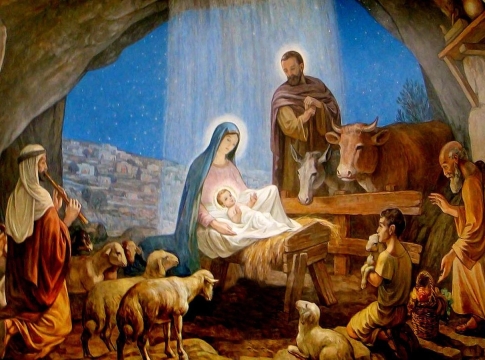
This is an extremely significant query. Worshiping Jesus is appropriate [if He is God], but idolatry and disobeying God’s command to worship Him alone occur when Jesus is not God (Exodus 20:3; Deuteronomy 5:7).
Does this mean that Jesus is God and has to be worshipped according to the Bible? We’ll focus on one Old Testament chapter for brevity’s sake, after which we’ll examine the life stories of Jesus found in the Gospels, the book of Acts, many New Testament letters, and finally Revelation. The argument will be that Jesus is God and should be worshipped as such because the entire Bible (Old and New Testament) supports this claim.
Old Testament
Isaiah 9:6-7
For to us a son is given, a child is born, and he will bear the responsibility for the government. And he will be referred to as the Prince of Peace, Mighty God, Wonderful Counselor, and Everlasting Father. There will never be a stop to his government’s expansion and tranquility. From that point on and forever after, he will establish and maintain David’s kingdom and sit on his throne, ruling it with justice and righteousness. This shall be accomplished by the passion of the Almighty LORD.
The background to these verses is a promise God made to King David in 2 Samuel 7. God promised to establish David’s kingdom forever. At this point in Israel’s history the kingdom is in decline and Israel has begun to be exiled out from their land by Assyria (Isaiah 9:1). In chapter 9, God is promising a reversal, a restoration, that instead of decline there will be enlargement, and great joy (Isaiah 9:3), and defeat of their enemies (Isaiah 9:4-5). But how will this come about? By the birth of a child, a son (Isaiah 9:6), who will rule and will be called “mighty God!” This child will be a descendant of David, that’s why he’ll reign on David’s throne, and he’ll reign for ever and ever – an eternal King (Isaiah 9:7). So God is promising a son who’ll rule for ever on David’s throne and who’ll be called mighty God!
It’s important to remember at this point that Jesus is a descendant of David (Matthew 1:1–17). Therefore, when you take into account the King theme in the Gospel accounts (see, for example, Matthew 2:2; 21:5; 26:29; 26:37; 26:42; 27:42; John 18:33; 18:37; 18:39; 19:3; 19:12; 19:14–15; 19:19; 19:21), it appears that Jesus is this “child [who] is born,” this “son [who] is given,” and who is mighty God.
New Testament
Synoptic Gospels (Matthew, Mark and Luke)
Every synoptic gospel describes [Jesus’ baptism]. “This is My Son, whom I love; with Him I am well pleased,” is the voice that God speaks during His baptism (Matthew 3:17; Mark 1:11; Luke 3:22).
This is also the witness found in other [gospel narratives], such as Mark 1:1 (albeit the term “Son of God” is omitted in some, but not all, of the manuscripts); Mark 3:11; Mark 5:7; and Mark 15:39. There are two references to Jesus and the Sabbath in Mark 2:23–3:6. “Therefore the Son of Man is Lord even of the Sabbath,” declares Jesus in Mark 2:28. Put another way, although Jesus claims to be the Lord of the Sabbath, the Old Testament attributes the Sabbath and its laws to God. If Jesus does not have the same authority as God, how can he claim to be the “Lord of the Sabbath”? Given this claim, it makes sense that the Pharisees desired Jesus’ execution (Mark 3:6).
Jesus questions His disciples in Matthew 16:15, “Who do you think I am?” “You are the Christ, the Son of the Living God,” Peter responds. Rather of disputing it now, Jesus addresses Peter, saying, “You are blessed because my Father in heaven revealed this to you” (Matthew 16:17). Peter’s evaluation of Jesus as the Son of the Living God is acknowledged by Jesus.
Jesus’ identity is also made abundantly evident throughout His trial. Why was Jesus crucified in the first place? The high priest asks Jesus, “I charge you under oath by the living God: Tell us if you are the Christ, the Son of God,” according to Matthew 26:63. Jesus answers, “Yes, it is as you say,” in Matthew 26:64. [Jesus asserts that He is the Son of God].
John’s Gospel
“In the beginning was the Word, and the Word was with God, and the Word was God,” declares John at the beginning of his gospel. In the beginning, he was with God (John 1:1–2).
It is quite evident from verse 14 that Jesus is [“the Word”]. Because of this, John claims that Jesus “was” God at the beginning of time in verses 1-2 and depicts Jesus as being “with God.”[1]
John the Baptist declares, “I have seen and I testify that this is the Son of God,” in John 1:34. In John 1:49, Nathaniel provides a similar testimony. The Jews persecute Jesus in John 5 after he cures an invalid on the Sabbath (John 5:16). “My Father is working until now, and I am working,” Jesus responds to them. Because he was not only violating the Sabbath but also referring to God as his own father and establishing his equality with God, the Jews were motivated to kill him even more (John 5:17–18).
The Jews understand that Jesus is claiming to be God implicitly. Because of this, they aim to murder Him for what they consider to be blasphemy. According to their own testimony, Jesus claimed to be God.
The pinnacle of Jesus’ deity claims is reached in John 8:56: Jesus said, “I tell you the truth: I am who I was before Abraham was born.” By this time, the Jews are obviously quite enraged by what Jesus has spoken and wish to stone him once more (John 8:59). However, why? Since God’s name of revelation in the Old Testament is “I AM.” (Exodus 3:14): “I AM WHO I AM,” God declared to Moses. “I AM has sent me to you,” is what you are to tell the Israelites.
In light of what Jesus has disclosed about Himself, it follows that Thomas’s words to the resurrected Jesus are “My Lord and my God.” Thomas understands that Jesus is God, as He has been revealing to us throughout His career.
Acts
We’ll focus on only one allusion from the Acts of the Apostles. Acts 9:1-2 describes how Saul was persecuting the church and locking up people for believing in Jesus. It is evident from his actions that he did not think Jesus was the Son of God. However, he begins teaching in the synagogues that “Jesus is the Son of God” (Acts 9:20) after encountering Jesus on the way to Damascus (Acts 9:3–9). This is obviously a very significant change in Paul’s perception of Jesus.
New Testament Letters
We’ll examine a significant allusion to Jesus in 1 Corinthians 8:6. However, there is only one God, the Father, who created everything and is the reason we exist, as well as one Lord, Jesus Christ, who is the reason we exist.
Here, Paul restates the Old Testament’s teaching that there is only one God and one Lord. “Hear, O Israel: The LORD our God, the LORD is one,” says Deuteronomy 6:4. He clarifies that the Lord is Jesus Christ, and God is our Father. Paul has therefore interpreted Deuteronomy 6:4 in this passage to include Jesus inside monotheism. Jesus is therefore perceived as divine once more.
Hebrews
The entirety of the book of Hebrews exalts Jesus as the magnificent Son. Moses, the priests of the Old Testament, the priesthood, and all sacrifices are not greater than him. Let’s focus only on chapter 1. Hebrews 1:6 quotes Deuteronomy 32:43 to state, “And again, when God brings his firstborn into the world, he says, ‘Let all God’s angels worship him.'” Jesus is clearly divine and should be worshipped, as evidenced by God’s instruction to His angels to worship Him!
Or take a look at Hebrews 1:8–9: However, in reference to the Son, he states, “O God, righteousness shall be the sceptre of your kingdom, and your throne will endure forever. God, your God, has exalted you above your colleagues by anointing you with the oil of joy because you have loved righteousness and hated wickedness (citing Psalm 45:6-7). Here, Jesus asserts once more that He is God and that He will rule forever (as demonstrated in Isaiah 9).
Revelation
Jesus is shown as being exalted and glorified as He rules in the book of Revelation. “I am the Alpha and the Omega,” declares the Lord God in Revelation 1:8, “who is, and who was, and who is to come, the Almighty.” Nevertheless, Jesus states these things at the close of the book in Revelation 22:13: God (the Father) and Jesus are both eternal, the Beginning and the close.
Revelations 4 and 5 also make this identification between the Father and the Son quite evident. John depicts God’s throne in chapter 4, where twenty-four elders and four live creatures are worshiping him (Revelation 4:6-11). The emphasis moves from God to Jesus in chapter 5. But according to Revelation 5:9–10, 12, even the twenty-four elders and the living creatures worship Jesus. The singing of “To Him who sits on the throne [God, see chapter 4] and to the Lamb be praise and honor and glory and power, for ever and ever” in Revelation 5:13 is, in fact, the culmination of the song. Because they are both God, God and Jesus (the Lamb) ought to be honored and worshipped equally.
Conclusion
For what reason do Christians revere Jesus? Considering that the Bible often attests to Jesus’ divinity. He is the second person of the Trinity and the Son of God. As a result, Jesus ought to be worshipped alongside God, precisely as the book of Revelation describes the living creatures and the 24 elders.
[1] Note: “The Word was a god” appears in the Living World Translation (created by Jehovah’s witnesses). This translation, however, is incorrect since, in order to be consistent, it should also translate John 1:12—”right to become children of a god”—and John 1:6, “there was a man sent from a god.” Yes, there are sound grammatical justifications for the above translation of John 1:1.





